In a co-ordinated announcement with Australia and Canada, the Prime Minister said the hope of a two-state solution with Israel was ‘fading, but we cannot let that light go out’
Keir Starmer has officially announced UK recognition for the state of Palestine to “revive the hope of peace.” In a co-ordinated announcement with Australia and Canada, the Prime Minister said the hope of a two-state solution with Israel was “fading, but we cannot let that light go out.” “In the face of the growing horror in the Middle East, we are acting to keep alive the possibility of peace and a two state solution. That means a state and secure Israel alongside a viable Palestinian state. At the moment we have neither.”
The Mirror looks at what recognition means.
READ MORE: Keir Starmer confirms UK formally recognises Palestine
What are the arguments for recognition?
Several governments – including the UK, Canada and France – believe recognising Palestine will keep alive the hope and momentum of a two-state solution. Keir Starmer said there is currently neither a secure state of Israel or Palestine and that recognising the latter revives “the hope of peace”.
In July, the PM promised to recognise Palestine if the situation did not change. It comes amid a global outcry at Israel’s brutal military offensive, which has killed more than 64,000 people, according to Gaza’s health ministry. The Foreign Office said the decision comes as the “situation on the ground in Gaza continues to worsen, Israel continues to expand its illegal settlements in the West Bank, and Hamas continues to hold the hostages”.
What are the arguments against recognition?
Critics of the PM argue that the recognition of Palestinian statehood will reward Hamas. The families of more than a dozen hostages taken by the militant group during its October 7, 2023, attack on Israel had urged Keir Starmer not to go ahead with the plan. They say the move “has dramatically complicated efforts to bring home our loved ones”.
The Board of Deputies of British Jews said recognition reduces “pressure on Hamas” and has done nothing to advance a ceasefire, free the hostages or stop the suffering of Palestinians. Israeli PM Benjamin Neyanahyu branded the UK’s decision “absurd”. But Mr Starmer said “a genuine two-state solution is the exact opposite of (Hamas’s) hateful vision”.
What does recognition mean for the conflict?
Deputy PM David Lammy admitted the UK’s recognition of a Palestinian state will have little immediate impact but will sustain hopes for an eventual peace settlement. He acknowledged that a Palestinian state would not emerge “overnight” and that “we are some significant distance” from two states – Palestine and Israel – existing alongside each other.
Mr Lammy said: “Will this feed children? No it won’t, that’s down to humanitarian aid. Will this free hostages? That must be down to a ceasefire.” But he said recognition was an attempt to get, or at least “hold out for” a two-state solution.
What does recognition mean in the UK?
Recognising a Palestinian state would allow the status of diplomatic missions to be upgraded. Currently, the Palestinian Authority delegation to the UK is not of embassy level and operates as a “diplomatic mission” based in Hammersmith, West London.
Embassy status would give the delegations protection and privileges under the Vienna Convention on Consular Relations and the Vienna Convention on Diplomatic Relations. The FCDO said the Foreign Secretary will write to her Palestinian counterpart in “due course to lay out the process for establishing full diplomatic relations”.
What is the position of other countries?
Keir Starmer confirmed the UK will recognise Palestine in a co-ordinated action with Canada and Australia. France is also due to follow suit. The UK, France and Canada are the first G7 countries to do so.
But the move sets the UK apart from the US. At a joint press conference with Mr Starmer on Thursday, Donald Trump said there was a “disagreement with the PM on that score” when asked about No10’s plans and called for the release of the hostages. Palestine is recognised by 147 of the UN’s 193 member states.
READ MORE: Join our Mirror politics WhatsApp group to get the latest updates from Westminster
